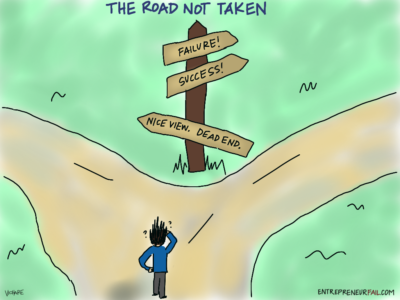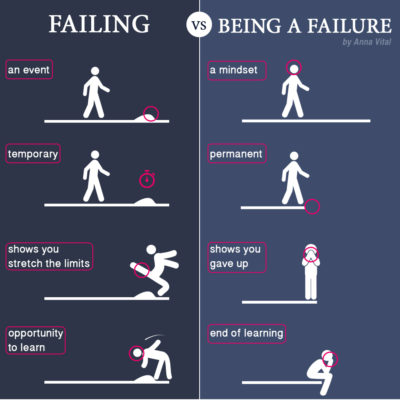
Failing can take a heavy toll on our self-esteem. Not achieving our desired outcome can make us feel like we’re not good enough, and give up on our dreams. If we can detach from our failures, and not see them as a reflection as our capabilities but as clues that can help us improve, we can gain much more from it. Learn why failing does not make you a failure and you can use it to take calculated steps towards success. (Estimated reading time: 5-6 minutes)
“Failure is not the opposite of success. It’s part of success.”
— Unknown
“I feel like a failure!”
We’ve all uttered those words at some point in our lives.
The bigger and more unconventional your goals are, the higher the chances that you’ll feel like a failure. Safer choices are less risky because the paths that lead to them have been well paved by those who have travelled them before.
For instance, traditional career paths like lawyers or doctors are the most straightforward. Careers in the creative industries, like artists and writers are more of a wildcard.
As a big dreamer who’s gone off the beaten track, I’ve had to come to terms with failure several times. It was especially hard to do when people close to me would highlight my failed attempts to prove my inadequacies. A family member once called me a ‘loser’ even though he witnessed all the hours, effort, and dedication I put into trying to make certain things materialize in my life.
It took many years for me to realize that their criticisms were a reflection of their own insecurities and not my capabilities. Undoing the damage that their disapproval had on my self-worth required that I change my perspective on failure and remove that label from my identity.

To do this, I studied the life stories of some of the most successful people in history, from scientific luminaries such as Einstein, Edison, and Freud to business gurus such as Warren Buffet and Steve Jobs as well as sports legends such Michael Jordan and Muhammad Ali.
While reading their narratives, I noticed that most of their failures were pivotal turning points that propelled them forward into success. They were intuitively aware that when it came to achieving the extraordinary, failure is something that they should anticipate, rather than be fearful of.
What makes a person successful isn’t not failing but learning how to handle failure. What’s important is that we get back up every time we fall and keep going. I began seeing failure as a strength rather than a weakness because the willingness to take a leap of faith, despite the possibility of failing, requires courage and an unwavering commitment to our standards.
When it comes to failure, what we’re really terrified about is how failing will make us feel. What does it say about who we are and our capabilities? It makes us vulnerable by stirring up our insecurities. We need to develop a thicker skin to withstand those blows to our ego. The key to this is believing that failing paves the way to success.

When we call ourselves a failure, and we let it become part of our identity, that’s when it impacts our self-esteem and cripple our attempts to take on challenges that could lead to progress. Maintain distance from your actions by viewing failure as nothing but constructive feedback that you can use to tweak your plans. You’ll see that failures are nothing but tasks that need correction, and not the result of being a flawed human being.
Be the Sherlock Holmes in your life – use each failure as a vital clue which can be used to solve a case.
Be an objective observer who knows how to take on a detached and strategic approach, without allowing the flames of passion and ego to consume you.
Here are five important reasons that will convince you why failing does not make you a failure:
1. You demonstrate courage and strength: Most people are unwilling to take risks because of the possibility of failing. It takes a brave and self-assured person to take that chance. This doesn’t mean that they aren’t afraid of failing but that they have developed the courage to manage fear while taking calculated steps towards their goals. The fact that you’ve tried is proof of success, regardless of the outcome because it demonstrates strength of character.
2. You gain valuable lessons that will move you closer to success: Every time that you fail you learn more about what does not work, which is just as important as learning what does. Your failed attempts offer valuable feedback which can be used to fine-tune your strategy. Those failures provide lessons that become stepping stones for future success.
When Thomas Edison, the inventor of the light bulb, was asked how it felt to fail 10,000 times before he succeeded in putting it together, he responded, “I have not failed. I’ve just found 10,000 ways that won’t work.”
3. You strengthen your resilience and character: Every struggle that you encounter on the road to victory bolsters your willpower and fortifies your resilience. Like a strength training workout that builds your muscles, every failure will develop your character traits if you manage to extract the wisdom from your experience.
Author J.K Rowling, who faced plenty of rejection in her early days as a new writer said, “you will never truly know yourself, or the strength of your relationships, until both have been tested by adversity. Such knowledge is a true gift, for all that it is painfully won, and it has been worth more than any qualification I ever earned.”
4. You become more adaptable to the rhythm of life: Failures are reality checks that reveal whether or not your thoughts and expectations are in alignment with the real world. Too often people get stuck in their own little bubbles, preferring to live in denial. When you’re willing to step out of your comfort zone, your stories either get validated or challenged. Failure can provide the wakeup call that you need to reconfigure and get onboard with the truth.
5. Success will be well-deserved and sweeter when you get there: Victory will always be a lot sweeter for those who have worked hard and earned it with blood, sweat, and tears. Once you reach your objective, you can look back on all that you had to go through and appreciate the lessons that you learned along the way. Your success will have more significance and meaning because of your struggles. An Olympic athlete who had to train for 100’s of hours to win a medal or the doctor who had to study for years to earn their degrees will attest to this euphoric feeling.
No matter how many times you fail, always remember that your worthiness doesn’t depend on your outcomes. Just observe any baby bird in its early stages, and you’ll see that no matter how many times it stumbles and falls while trying to fly out of the nest, it doesn’t give up. It knows that it was born to fly. And that’s the same for us – when we believe in ourselves, we’ll take as many chances as we need to until the day that we start soaring.
All my best on your journey,
Seline

Reflection Question: Does the thought of failing at something bother you? What exactly is it about failing that you’re most afraid of?
Did you like this post? Sign up below and I’ll send you more awesome posts like this every week.

It is comfortable enough for me to know that I am giving my best shot every time and working to improve my methods or mental perception with every end result I encounter in life.
Lucy, glad to hear that you were inspired! All the best. – Seline
It’s a truly inspiring post. Thanks! Think we should reconsider our approach to failure.
Hey Seline!
I agree – everyone fails at some point- the greatest inventors of world history failed before they found success. Edison had hundreds of failures before he developed the light bulb. Tesla failed countless times before his inventions came to exist. We do not truly succeed unless we fail at times- wish it was easier but I guess that just seems to be how the world works!
Thanks for reminding us of how normal it is.
Yeah did you know Thomas Edison failed hundreds of times before he made a working light bulb? And George Washington Carver had hundreds of failed product that later gave us common items like soap and shampoo and peanut butter when he was doing his peanut experiments? Failure is one of the best and most important learning tools of all!
Oh cool post, Seline. 🙂